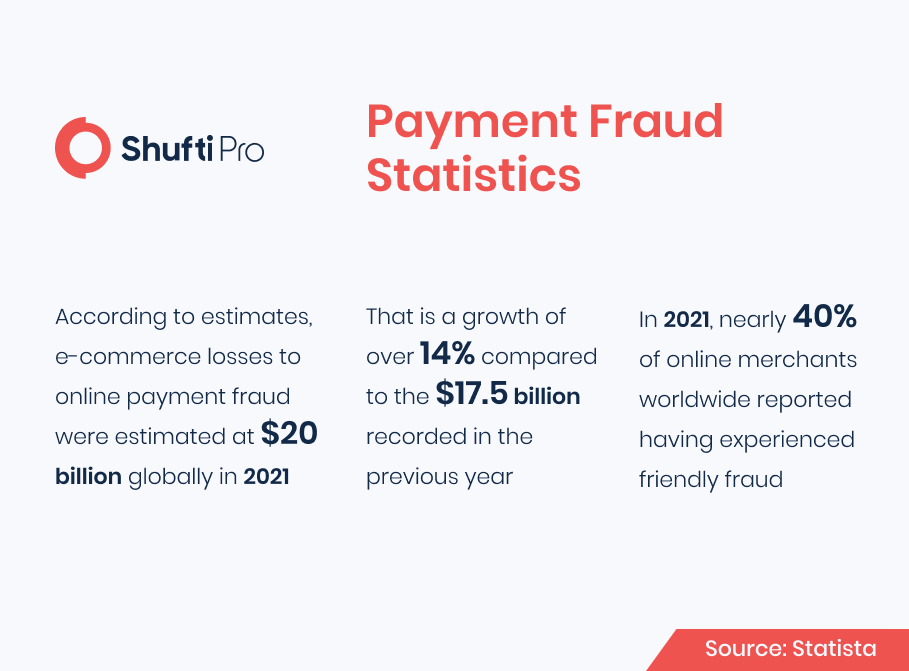KYC Verification – Fraud Prevention in FinTech & the Payments Industry

The growth of the online payment industry and FinTech companies comes with a simultaneous increase in fraud and financial crime. According to a recent study, about 10% of the average spending in the online payments industry and FinTech is taken up by fraud prevention measures. This is because detecting and preventing payments fraud is significant to avoiding financial and reputational losses in any given firm.
In order to ensure that their operations are fraud-free and they are compliant with international regulations, financial firms incorporate KYC verification solutions. Finding the balance between effective fraud prevention and cost management is one of the biggest challenges for businesses.
Risks Faced by Financial Institutions
Financial operations comprise numerous stages and each of them is a potential target for fraudsters. For this reason, businesses are now offered robust identity verification solutions that can be easily integrated as part of their online platforms. With these verification solutions, mobile and web platforms of eCommerce service providers can detect fake identities and fraudulent transactions. That being said, emerging technologies and the latest fraud techniques have made payment fraud detection more and more difficult for firms operating in the payments industry.
Looking on the bright side, it’s not necessary that the solution to a complex and unpredictable problem must also be complicated. For instance, technology has also improved the system of verifying and screening identities against sanctions lists using numerous AI algorithms. This means that the detection and prevention of payments are not that problematic after all. Compared to the complex and time-consuming verification measures that were used previously, today’s solutions take mere seconds to verify identities using nothing more than a selfie from the customer. What’s important for businesses is to adopt a risk-based approach toward fraud prevention while taking into consideration the latest trends in fraudulent activity. Developing customer trends through transaction monitoring and background screening also requires a robust AML Screening solution.
KYC – Identity Verification
Unlike banks and financial institutions that constantly face the risks of fraudulent activities and bigger risks of money laundering, the payments industry is relatively less regulated. Banks are bound to implement procedures to verify the identity of their customers and analyse risks associated with their transactions.
The Know Your Customer (KYC) measure is incorporated for the purpose of detecting fraudulent entities at the onboarding stage to prevent money laundering. The onboarding stage is the best for KYC because it eliminates the fraudulent entity before their account is created. For legitimate customers, the process doesn’t delay or create any problems for the rest of the operations throughout the customer journey.
Transaction Monitoring
KYC verification in itself is not enough when the aim is to protect financial institutions from crimes like money laundering and terrorist financing. As customers with legitimate identities can also be part of a money laundering scheme, it is equally important to perform ongoing transaction monitoring to analyse trends. By implementing AI-driven measures to mitigate the risks of financial crime, the payments industry and FinTech firms can prevent becoming the source of money laundering.
A FinTech company can never know which online transaction involves money coming from illegitimate sources. For this purpose, they require robust AML screening measures to detect, flag, and report suspicious transactions. Furthermore, the increasing rate of online payments accounts for more and more transaction records with every passing second. To cope with this speed, businesses operating in the payments industry need to incorporate innovative solutions that can detect anomalies in real-time.

Additional Authentication Measures
Apart from transaction monitoring to analyse fraudulent transactions, FinTech companies also need measures to ensure that only their real customers have access to their online platforms. In the European Union, financial firms are required by law to incorporate sufficient customer authentication measures. Although these firms usually have set limits for the maximum amount that can be deposited into an account, it is also important to know who is accessing the customers’ accounts. With the help of additional authentication measures like 2 factor authentication, firms add a layer of security and are able to determine that their real customers are performing the particular transaction.
Apart from 2-factor authentication, there are new and emerging fraud detection techniques that can allow firms to have better oversight of their customers’ transactions. Financial firms are urged by financial regulators to look out for deviations in normal transaction patterns, exceeding thresholds, unusual transactions from foreign sources, and discrepancies in IP addresses.
How the Payments Industry can Be Fraud-Free
Most of the authentication techniques mentioned above are heavily dependent on the analysis of trends. This is because online transactions offer a variety of data points that can be used to analyse behavioural patterns and high-risk transactions. Organisations that consider fraud prevention measures as an extra activity that can be skipped are often under the weather with regulatory fines. When it comes to operations that involve money, it is always advisable to make security the top priority.
When it comes to prominent FinTech firms, securing their operations with measures like encryption and tokenisation can work. However, smaller businesses do not afford these practices. Startups and SMEs should opt for measures that verify other aspects of their customers to be sure about their identity and their background. Address verification is one such technique that verifies the numbers and addresses given along with the credit card details to get better oversight of customers. For instance, businesses that use address verification can verify the zip code and street number from a billing address by matching it against the information provided for the owner’s credit card registration.
What Shufti Offers
Considering the fast-paced growth of the Fintech sector and the payments industry, businesses have to re-evaluate and implement customer due diligence protocols according to the updated regulations. If you are a business operating in the Fintech industry, it all comes down to the following questions:
- Are you complying with the country’s KYC/AML laws that you are serving?
- What customer due diligence protocols are you currently following?
- Is your screening process providing a higher customer acquisition rate or your drop-off is increasing?
- Is the process effective in all regions of the world?
Shufti’s identity verification solution allows your business to avoid the hassle of a manual verification system and saves it from regulatory fines. The system deploys thousands of AI models to verify identities in less than a second with an accuracy of 98.67%.
Want to know more about this solution? Get in touch with our experts!

 Explore Now
Explore Now













